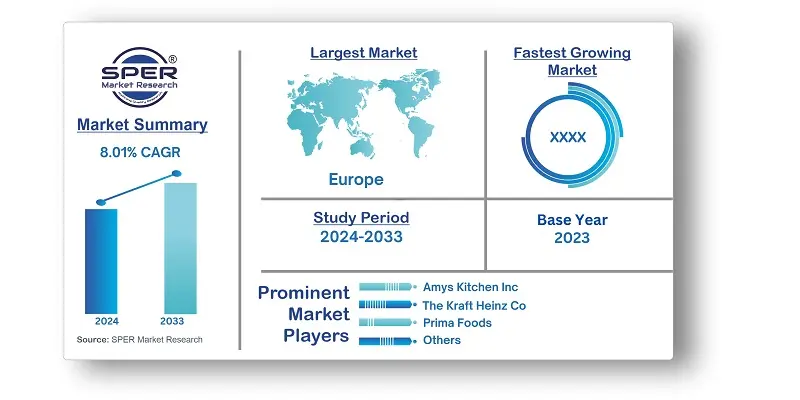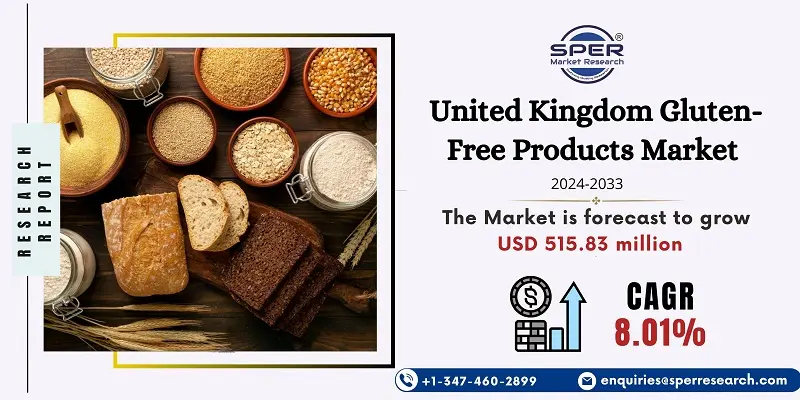
United Kingdom Gluten-Free Products Market Growth, Size, Trends, Demand and Future Outlook
United Kingdom Gluten-Free Products Market Size- By Product Categories, By Grain Type, By Age, By Distribution Channels- Regional Outlook, Competitive Strategies and Segment Forecast to 2033
| Published: May-2024 | Report ID: FOOD2456 | Pages: 1 - 107 | Formats*: |
| Category : Food & Beverages | |||
- Lindt Lindor debuted gluten-free chocolates in a variety of formulations and flavours in May 2022, including orange and almond, hazelnut, caramel and sea salt, and many more.
- In April 2021: Signature Brew, a British brewer, debuted a new gluten-free Indian Pale Ale (IPA) and reintroduced another beer under the same brand name in its native market.


| Report Metric | Details |
| Market size available for years | 2020-2033 |
| Base year considered | 2023 |
| Forecast period | 2024-2033 |
| Segments covered | By Product Categories, By Grain Type, By Age, By Distribution Channels |
| Regions covered | London, East Anglia, Southwest, Southeast, Scotland, East Midlands, Yorkshire & Humberside |
| Companies Covered | Amys Kitchen Inc, Co-Operative Group Ltd, Fria Brod AB, Genius Food Ltd, McCormick Foods Ltd, Nairns Oatcakes Ltd, Natures Path Foods, Nestle SA, Prima Foods, The Kraft Heinz Co. |
- Athletes
- Celiac Disease Patients
- Children
- Elderly Individuals
- Fitness Enthusiasts
- Health-Conscious Consumers
- Individuals with Gluten Sensitivity or Intolerance
- Parents of Children with Gluten Intolerance
- People with Autoimmune Disorders
- Young Adults
| By Product Categories: |
|
| By Grain Type: |
|
| By Age: |
|
| By Distribution Channels: |
|
- United Kingdom Gluten-Free Products Market Size (FY’2024-FY’2033)
- Overview of United Kingdom Gluten-Free Products Market
- Segmentation of United Kingdom Gluten-Free Products Market By Product Categories (Bakery Products, Condiments, Seasonings, and Spreads, Dairy/Dairy Substitutes, Meat/Meta Substitutes, Others)
- Segmentation of United Kingdom Gluten-Free Products Market By Grain Type (Rice-Based Gluten-Free Products, Corn-Based Gluten-Free Products, Quinoa-Based Gluten-Free Products, Nut-Based Gluten-Free Products, Others)
- Segmentation of United Kingdom Gluten-Free Products Market By Age (Adult, Children, Others)
- Segmentation of United Kingdom Gluten-Free Products Market By Distribution Channels (Supermarkets and Hypermarkets, Speciality Health Food Stores, Online Retail, Foodservice and Restaurants)
- Statistical Snap of United Kingdom Gluten-Free Products Market
- Expansion Analysis of United Kingdom Gluten-Free Products Market
- Problems and Obstacles in United Kingdom Gluten-Free Products Market
- Competitive Landscape in the United Kingdom Gluten-Free Products Market
- Impact of COVID-19 and Demonetization on United Kingdom Gluten-Free Products Market
- Details on Current Investment in United Kingdom Gluten-Free Products Market
- Competitive Analysis of United Kingdom Gluten-Free Products Market
- Prominent Players in the United Kingdom Gluten-Free Products Market
- SWOT Analysis of United Kingdom Gluten-Free Products Market
- United Kingdom Gluten-Free Products Market Future Outlook and Projections (FY’2024-FY’2033)
- Recommendations from Analyst
1.1. Scope of the report1.2. Market segment analysis
2.1. Research data source2.1.1. Secondary Data2.1.2. Primary Data2.1.3. SPER’s internal database2.1.4. Premium insight from KOL’s2.2. Market size estimation2.2.1. Top-down and Bottom-up approach2.3. Data triangulation
4.1. Driver, Restraint, Opportunity and Challenges analysis4.1.1. Drivers4.1.2. Restraints4.1.3. Opportunities4.1.4. Challenges4.2. COVID-19 Impacts of the United Kingdom Gluten-Free Products Market.
5.1. SWOT Analysis5.1.1. Strengths5.1.2. Weaknesses5.1.3. Opportunities5.1.4. Threats5.2. PESTEL Analysis5.2.1. Political Landscape5.2.2. Economic Landscape5.2.3. Social Landscape5.2.4. Technological Landscape5.2.5. Environmental Landscape5.2.6. Legal Landscape5.3. PORTER’s Five Forces5.3.1. Bargaining power of suppliers5.3.2. Bargaining power of buyers5.3.3. Threat of Substitute5.3.4. Threat of new entrant5.3.5. Competitive rivalry
5.4. Heat Map Analysis
6.1. United Kingdom Gluten-Free Products Market Manufacturing Base Distribution, Sales Area, Product Type6.2. Mergers & Acquisitions, Partnerships, Product Launch, and Collaboration in United Kingdom Gluten-Free Products Market
7.1. United Kingdom Gluten-Free Products Market Size, Share and Forecast, By Product Categories, 2020-20267.2. United Kingdom Gluten-Free Products Market Size, Share and Forecast, By Product Categories, 2027-20337.3. Bakery Products7.4. Condiments, Seasonings, and Spreads7.5. Dairy/Dairy Substitutes7.6. Meat/Meat Substitutes7.7. Others
8.1. United Kingdom Gluten-Free Products Market Size, Share and Forecast, By Grain Type, 2020-20268.2. United Kingdom Gluten-Free Products Market Size, Share and Forecast, By Grain Type, 2027-20338.3. Rice-Based Gluten-Free Products8.4. Corn-Based Gluten-Free Products8.5. Quinoa-Based Gluten-Free Products8.6. Nut-Based Gluten-Free Products8.7. Others
9.1. United Kingdom Gluten-Free Products Market Size, Share and Forecast, By Age, 2020-20269.2. United Kingdom Gluten-Free Products Market Size, Share and Forecast, By Age, 2027-20339.3. Adult9.4. Children9.5. Others
10.1. United Kingdom Gluten-Free Products Market Size, Share and Forecast, By Distribution Channels, 2020-202610.2. United Kingdom Gluten-Free Products Market Size, Share and Forecast, By Distribution Channels, 2027-203310.3. Supermarkets and Hypermarkets10.4. Specialty Health Food Stores10.5. Online Retail10.6. Foodservice and Restaurants
11.1. United Kingdom Gluten-Free Products Market Size and Market Share
12.1. United Kingdom Gluten-Free Products Market Size and Market Share By Region (2020-2026)12.2. United Kingdom Gluten-Free Products Market Size and Market Share By Region (2027-2033)12.3. London12.4. East Anglia12.5. Southwest12.6. Southeast12.7. Scotland12.8. East Midlands
12.9. Yorkshire & Humberside
13.1. Amys Kitchen Inc13.1.1. Company details13.1.2. Financial outlook13.1.3. Product summary13.1.4. Recent developments13.2. Co-Operative Group Ltd13.2.1. Company details13.2.2. Financial outlook13.2.3. Product summary13.2.4. Recent developments13.3. Fria Brod AB13.3.1. Company details13.3.2. Financial outlook13.3.3. Product summary13.3.4. Recent developments13.4. Genius Food Ltd13.4.1. Company details13.4.2. Financial outlook13.4.3. Product summary13.4.4. Recent developments13.5. McCormick Foods Ltd13.5.1. Company details13.5.2. Financial outlook13.5.3. Product summary13.5.4. Recent developments13.6. Nairns Oatcakes Ltd13.6.1. Company details13.6.2. Financial outlook13.6.3. Product summary13.6.4. Recent developments13.7. Natures Path Foods13.7.1. Company details13.7.2. Financial outlook13.7.3. Product summary13.7.4. Recent developments13.8. Nestle S.A.13.8.1. Company details13.8.2. Financial outlook13.8.3. Product summary13.8.4. Recent developments13.9. Prima Foods13.9.1. Company details13.9.2. Financial outlook13.9.3. Product summary13.9.4. Recent developments13.10. The Kraft Heinz Co13.10.1. Company details13.10.2. Financial outlook13.10.3. Product summary13.10.4. Recent developments13.11. Others
SPER Market Research’s methodology uses great emphasis on primary research to ensure that the market intelligence insights are up to date, reliable and accurate. Primary interviews are done with players involved in each phase of a supply chain to analyze the market forecasting. The secondary research method is used to help you fully understand how the future markets and the spending patterns look likes.
The report is based on in-depth qualitative and quantitative analysis of the Product Market. The quantitative analysis involves the application of various projection and sampling techniques. The qualitative analysis involves primary interviews, surveys, and vendor briefings. The data gathered as a result of these processes are validated through experts opinion. Our research methodology entails an ideal mixture of primary and secondary initiatives.



Frequently Asked Questions About This Report
PLACE AN ORDER
Year End Discount
Sample Report
Pre-Purchase Inquiry
NEED CUSTOMIZATION?
Request CustomizationCALL OR EMAIL US
100% Secure Payment






Related Reports
Our Global Clients
Our data-driven insights have influenced the strategy of 200+ reputed companies across the globe.




















